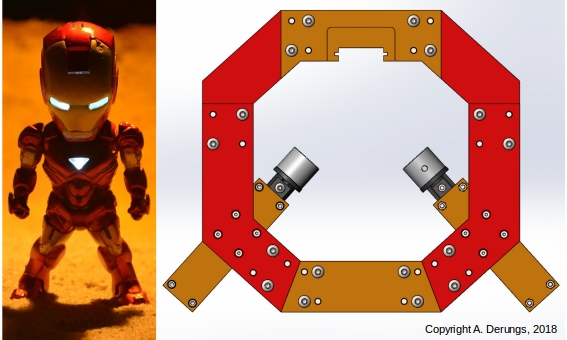Seminar: Iron man – Mark II
Seminar Iron Man Suit
Course description
Wearable sensor technology, particularly inertial measurement sensors are used in various motion analysis including applications in sport, medicine, and rehabilitation of patients after stroke. However, how would a hemiparetic stroke patient mount a sensor?
In the initial Iron man project, we designed and built a prototype to self-attach a wrist-worn sensor using 3D printing technology, see Figure 1. We extended our assistive robot with sensors, electronics, a microcontroller and coded an initial controlling routine.

Fig.1. The pictures illustrate the progress of the initial Iron man project during the summer term 2018, including a first sketch of the Iron man gantry vision to the final prototype.
In this follow-up project, we continue our assistive robot project and focus further on electronics and software and aim to implement a “Jarvis”- inspired human-computer-interaction approach. We will evaluate approaches to control robot-routines via voice-command, investigate audio feedback, and explore the possibilities provided by the versatile m5stack-microcontroller. Further improvements on the 3D-printed robot-structure and the wrist-band could be designed too, e.g. to re-charge the battery of the wrist-band.
In particular, we aim to further develop and extend our assistive robot, allowing users to self-attach and remove a wristband with an integrated motion sensor. A key-aspect of this seminar includes the evaluation of the usability, hence a study with healthy subjects will be implemented.
Learning objectives
- Learning design principles in an engineering project, including 3D-printing, mechanical engineering, electronics, sensors and actuators, as well as software.
- Defining design requirements and propose solutions for wearables.
- Developing mechanical parts, 3D-printing, electronic and software engineering.
- Gain practical experience in an interdisciplinary systems-engineering project.
- (Wearable) Sensor technology used in rehabilitation, i.e. for hemiparetic patients after stroke.
- Teamwork.
Course data
| ECTS | 5 / 7.5 |
| Project type | MSc.-Seminar (Group work), Extension to MSc.-Thesis can be discussed. |
| Work distribution | 10% Theory, 60% Programming 30% Evaluation |
| Presence time | Lecture: 1SWS, Exercises: 3SWS |
| Useful knowledge | Mech./El./Inf.- Engineering, Python, m/e-CAD design knowledge beneficial |
| Period | Winter semester 2018/19 |
Literature
Up-to-date literature recommendations will be provided during the seminar.
Contact
Adrian Derungs
- Job title: Researcher
- Phone number: +49 9131 85-23605
- Email: adrian.derungs@fau.de


